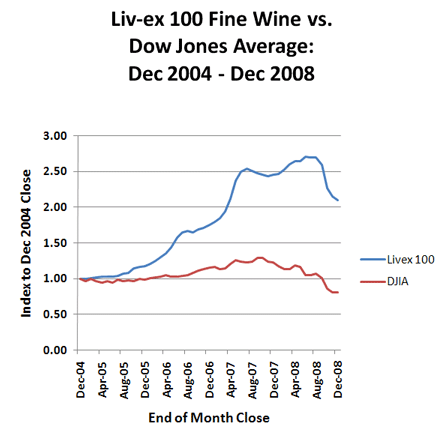At a time when the only thing consistent in the stock market is volatility, investing in wine offers you steady profit growth - with a more fun, tasty experience than your typical investment opportunity.
You can't buy a share of Google and have close friends over to drink some of it. You can, however, have good company over to taste your 1989 Bordeaux. David Sokolin, a highly respected wine merchant with years of experience, states that IGW ("Investment Grade Wines") should return between 10 and 12 percent annually. He also says that they will do this with lower volatility compared to stocks and bonds. For example, from 2002-2007, Coca-Cola's stock (NYSE:KO) went up 9.72%. If you were to buy a case of 2005 La Mission Haut Brion back in 2008 for $7,800, you might expect it to be valued at $30,000 in the year 2018, a 284.6% gain!
That's pretty impressive for a bunch of fermented grape juice.
So now that I have your attention, let us begin to discover the many ways on how to invest in wine.
Finding a Winning Wine
Many things determine a wine's value, but the classic law of supply and demand is a major component of determining whether or not a wine is investment worthy.
For example, when a highly scored and highly desirable wine reaches maturity, people start consuming it. As soon as a cork is popped on one of these bottles, the value of all unopened bottles immediately increases, since there are fewer to go around.
Another factor influencing wine value is its rating. Professional wine critics provide a score based on a wine's characteristics, including smell (or "nose"), appearance, and obviously, taste.
The most prominent critic, Robert Parker, always seems to have the most influence on a wine's value. He's been known to raise a bottle's price by thousands of dollars all with the score he granted it.
That kind of market reaction is what investors hope for when they purchase wine that has not yet been tasted by critics. If they pick one that ends up with a rave review, they will have likely paid the cheapest price for the wine, and the value could potentially shoot through the roof overnight.
For example, a bottle of 2003 Scarecrow (a California wine) earned a score of 98 out of 100 from Parker. This score alone sent the bottle's value from $100 per bottle to $1000 per bottle. This result makes investing in wine an attractive market to give attention and interest.

How to Begin Investing in Wine
To start investing in wine is rather simple. In fact, even if you don't have optimal storage conditions or a place to cellar your wine, many retailers or other sources will hold your wine while it matures or until you wish to sell it.
Purchasing wine that has resale market value is not the easiest thing in the world to find. You can't just book a plane to France, go to Château Pétrus in the Bordeaux region and knock on the door asking for a case of their finest.
Instead, there are a couple ways of getting that bottle of your dreams. I suggest developing a great relationship with a retailer who imports wine from a desired winery. This way, when you wish to resell that particular wine, there's no question of its provenance.
The second best option for finding investment-worthy wines would be the Internet. Many websites sell cases and bottles of quality wines for collectors 24/7. You should be cautious with this strategy, however, because there have been times when websites try to sell fakes or poorly stored/spoiled wine to well-meaning collectors.
Auction houses such as Christie's and Sotheby's are also great routes to take for investing in wine, but you may be paying a healthy amount more.
Futures are another popular way to invest in wine. In wine lingo, futures is basically wine that has not yet been bottled or presented to the public. It's a sure way of buying wine at its cheapest price - but you need patience. It may take two years to even get your hands on the purchased wine.
However, if you're buying futures from a vineyard with a reputable product, then you may strike the jackpot five to 10 years later when the wine has matured and restaurants and consumers are looking to buy it. The other positive - you're naming the price. When you have your hands on a valuable and highly sought-after bottle, you are selling it at a price that is comfortable to you. If the price is not right, than you have the right to hold onto the bottle until you find a buyer willing to pay a price that you agree with.
Whether you're just getting interested in wine as an asset or a serious collector, there are handsome profits to be made in the industry of investing in wine.
News and Related Stories:
- Money Morning
Investing in Wine - Christie's:
Fine Wine Auction - Sotheby's Wine:
Homepage - Liv-Ex:
Homepage - Sokolin:
Fine Wine Merchant


